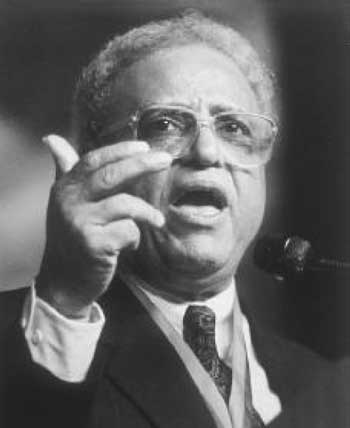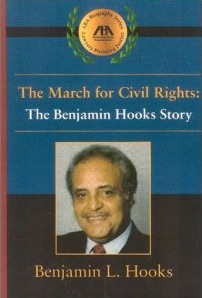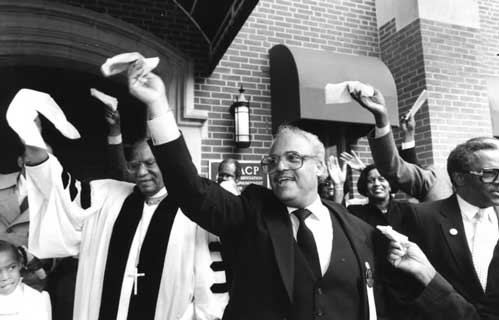‘Our brothers and sisters are crying to us, 'Is anyone listening? Does anyone care?'’
Benjamin Hooks
January 31, 1925-April 15, 2010Benjamin L. Hooks, 85, a champion of minorities and the poor who as executive director of the NAACP revived the organization’s mission and membership, died at his home in Memphis on April 15. Cause of death was not announced.
Rev. Hooks became executive director of the NAACP in 1977, taking over a group that was $1 million in debt and had shrunk to 200,000 members from nearly a half-million in the 1950s and 1960s. He pledged to increase enrollment and raise money for the organization.
"Black Americans are not defeated," he told Ebony magazine soon after his induction. "The civil rights movement is not dead. If anyone thinks that we are going to stop agitating, they had better think again. If anyone thinks that we are going to stop litigating, they had better close the courts. If anyone thinks that we are not going to demonstrate and protest, they had better roll up the sidewalks."
Dr. Benjamin Hooks recalls two early experiences with racism, one during his Army days, one as a law student.By the time he ended his position as executive director in 1992, the group rebounded, with membership growing by several hundred thousand. Toward this, he created community radiothons to make the public more aware of activities by local NAACP branches and boost membership.
Rev. Hooks also created an initiative that expanded employment opportunities for blacks in Major League Baseball and launched a program in which corporations participated in economic development projects in black communities.
Rev. Hooks’s activism was spurred in part by his experience guarding Italian prisoners of war while serving in the Army during World War II. He was part of a group assigned to escort the prisoners from Fort Benning to camps in different parts of Georgia. At a scheduled rest stop for dinner in Columbus, GA, the foreign prisoners “marched into a little restaurant and ate dinner, and those of us who were black soldiers, American citizens, couldn’t have a glass of water in there,” he recalled. “We had to guard them from the outside. That was the irony of it. Here I am, a black soldier, picked up his weapons—I didn’t volunteer but had been drafted—to defend the honor of America and was prepared and willing to do it… I’m guarding soldiers who had picked up their weapons to destroy our way of life. But because they were white and I’m black, they could sit in the cafeteria and have dinner. I could guard them, but I couldn’t sit down and have a meal. It was 20 years later that I could do so. That kind of burned.”
Years later, though, he would express his sense of progress in the fundamental terms that also served as a rebuke to more militant activists.
"I wish I could tell you every time I was on the highway and couldn't use a restroom," he said. "My bladder is messed up because of that. Stomach is messed up from eating cold sandwiches. So I can't tell you how I feel about the question, 'Has integration worked?' All these intellectual superegoists sit around trying to pinpoint where it hasn't. But I have to begin at the fundamental issue that I can drive from Houston to my home in Memphis and stop for a hamburger."
‘I’m gonna stay on the battlefield ‘til I die’: An excerpt from This Sunday Morning with the Rev. Benjamin Hooks, pastor, Greater Middle Baptist Church, Memphis, TN. From the mid-‘90s.When no law school in the South would admit him, he used the GI bill to attend DePaul University in Chicago, where he earned a law degree in 1948. He later opened his own law practice in his hometown of Memphis, TN.
"At that time you were insulted by law clerks, excluded from white bar associations and when I was in court, I was lucky to be called 'Ben,'" he once said in an interview with Jet magazine. "Usually it was just 'boy.'"
In 1965 he was appointed to a newly created seat on the Tennessee Criminal Court, making him the first black judge since Reconstruction in a state trial court anywhere in the South.
"It was a national story for a black in the Deep South to be nominated for a judgeship," he said years later.
Rev. Hooks’s six-decade career produced a number of other significant milestones as well. In 1972, he became the first black member of the Federal Communications Commission, where he championed minority ownership of television and radio stations. He successfully lobbied on behalf of a national holiday being declared on the birthday of Martin Luther King, Jr. and for a number of fair housing, voting and civil rights bills. Seeking to expand employment opportunities, he oversaw the sigining of dozens of “Fair Share” agreements with companies such as Kmart, which agreed to hire black employees and buy from black employers.
"His legacy was really enforcing civil rights victories on corporate America," Benjamin Jealous, NAACP president, told The Washington Post, "saying to corporate leaders, 'segregation is illegal but it still exists inside your company, and we have to find a way to work together to change that.' "
In addition, Rev. Hooks was a minister at two Baptist churches, in Memphis and Detroit, and sat on the board of the Rev. Martin Luther King Jr.'s Southern Christian Leadership Conference. He also dabbled in business, serving a short stint as president of Mahalia Jackson Chicken Systems, a fast-food fried-chicken chain that folded after two years.
But his legacy rested firmly on his stewardship of the NAACP, which he guided through an extended period of organizational turmoil and political challenges from the highest levels of government.
"The nation best remembers Benjamin Hooks as the leader of the NAACP," President George W. Bush said in 2007 when he presented Hooks with the Presidential Medal of Freedom. "Dr. Hooks was a calm yet forceful voice for fairness, opportunity and personal responsibility. He never tired or faltered in demanding that our nation live up to its founding ideals of liberty and equality."
Nearly two decades earlier, Hooks pleaded with Bush's father, then-President George H.W. Bush, for action on a string of gasoline bomb attacks in the South that in December 1989 killed a federal judge in Alabama and a black civil rights lawyer in Savannah, GA. The Hooks family was also said to be a target of the bombers.
The same month, another bomb was intercepted at an NAACP office in Jacksonville, Fla. and an Atlanta television station received a letter threatening more attacks on judges, attorneys and NAACP leaders.
Walter Leroy Moody, now 75, was convicted of the killings and other charges in 1997 and remains on Alabama's death row.
An excerpt from Dr. Benjamin Hooks’ final day in the pulpit of Greater Middle Baptist Church, Memphis, TN, December 2008President Richard Nixon nominated Hooks to the Federal Communications Commission in 1972. He was its first black commissioner, serving for five years before resigning to lead the NAACP.
At the FCC, he addressed the lack of minority leadership in media and persuaded the commission to propose a new rule requiring TV and radio stations to be offered publicly before they could be sold. Minority employment in broadcasting grew from three percent to 15 percent during his tenure.
He later was the chairman of the board of directors of the National Civil Rights Museum in Memphis and helped create The Benjamin L. Hooks Institute for Social Change at the University of Memphis.
‘All Americans can be grateful for the good works and the good life of Benjamin L. Hooks’
President George W. Bush presents Presidential Medal of Freedom Award, the highest civilian honor in the United States, to Dr. Benjamin Hooks on November 5, 2007In his last keynote speech to an NAACP national convention in 1992, he urged members who had found financial success to never forget those less fortunate.
"Remember," he said, "that down in the valley where crime abounds and dope proliferates ... where babies are having babies, our brothers and sisters are crying to us, 'Is anyone listening? Does anyone care?'"
In retirement, Rev. Hooks resumed preaching at the Greater Middle Baptist Church in Memphis, where he had begun preaching in 1956; taught at Fisk University in Nashville; and served as president of the National Civil Rights Museum in Memphis. In 2000, the University of Memphis established the Benjamin Hooks Institute for the study of civil rights.
In the early 1950s, while practicing law in Tennessee, he married Frances Dancy, a teacher who gave up her career to serve as her husband's adviser and secretary for decades. On March 24, 2001, the couple renewed their wedding vows for the third time, after nearly a half-century of marriage, in a ceremony held at the Greater Middle Baptish Church. Mrs. Hooks survives, along with their daughter, Patricia Gray; and a sister.
***
Dr. Benjamin Hooks: In His Own Words
"It's a shame some young black folks think the civil rights movement started with Rosa Parks and Doctor King. Because if you believe that you let them take your mind...that black folks did nothing to help themselves from 1619 to way up in 1955. Which is a big lie."
"If we have opened these doors...use them! There's a library down there. Get a book! Open it! Read it! Learn something. Learn Physics. Learn your Algebra. Don't claim it's a white man's thing."
"Young folks, take advantage of your opportunity. And if we do that, I think that one day we'll bring about that day when we'll be judged by the content of our character and not the color of our skin."
"Its time today…to bring it out of the closet. No longer can we provide polite, explicable reasons why Black America cannot do more for itsel. I am calling for a moratorium on excuses. I challenge black America today—all of us—to set aside our alibis." —speech to the 1990 NAACP Conveniton
"Black Americans are not defeated. The civil rights movement is not dead. If anyone thinks that we are going to stop agitating, they had better think again. If anyone thinks that we are going to stop litigating, they had better close the courts. If anyone thinks that we are not going to demonstrate and protest ... they had better roll up the sidewalks." —as quoted in Ebony magazine shortly after his election as executive director of the NAACP on November 6, 1976
There are a lot of ways an oppressed people can rise. One way to rise is to study, to be smarter than your oppressor. The concept of rising against oppression through physical contact is stupid and self-defeating. It exalts brawn over brain. And the most enduring contributions made to civilization have not been made by brawn, they have been made by brain. —1980, explaining why the NAACP was against using violent means to achieve civil rights goals
“A young black man can’t understand what it means to have something he’s never been denied. I can’t make them understand the mental relief I feel at the rights we have. It almost infuriates me that people don’t understand what integration has done for this country.” —speaking to U.S. News & World Report
Founder/Publisher/Editor: David McGee
Contributing Editors: Billy Altman, Laura Fissinger, Christopher Hill, Derk Richardson
Logo Design: John Mendelsohn (www.johnmendelsohn.com)
Website Design: Kieran McGee (www.kieranmcgee.com)
Staff Photographers: Audrey Harrod (Louisville, KY; www.flickr.com/audreyharrod), Alicia Zappier (New York)
E-mail: thebluegrassspecial@gmail.com
Mailing Address: David McGee, 201 W. 85 St.—5B, New York, NY 10024





